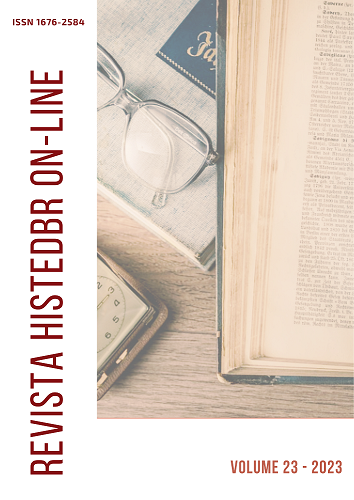Abstract
This text intends to analyze the categories contradiction and totality in the relationship between universal-singular-particular, from the perspective of historical materialism and historical-critical pedagogy, in order to identify the contributions of this relationship in educational work for the development of human diversity, according to with the particularities of a society governed by capital. The text is divided into two moments. At first, it discusses the double meaning of work in Marx. Work as a fundamental activity in the process of transforming the outside world and oneself. But that, in a society divided into classes, the individual is separated from the social and historical accumulation of humanity, therefore, prevented from manifesting his diversity in fullness. In the second moment, it seeks in the educational work the universal-singular-particular relationship according to the categories contradiction and totality, that is, the way in which the human race contains the singular individual, at the same time that this individual realizes universality. This relationship results in the manifestation of particularity, which is constituted as a mediation and becomes responsible for the development of the individual and his diversity. Finally, it concludes on the pitfalls of discourses on diversity, as well as the need to think about emancipation beyond the achievements of civil and political rights by different social and cultural groups, which, although necessary, do not correspond to human emancipation so that the individual manifests his diversity in fullness.
References
ALVES, A. J. Ciência, força produtiva e capital na crítica marxiana da economia política. Projeto História, São Paulo, n. 34, p. 277-288, jun. 2007. Disponível em: https://bityli.com/utQ1Q Acesso em: 20 out. 2022.
BARATA-MOURA, J. Totalidade e contradição: acerca da dialética. 2. ed. Lisboa: Edições Avante, 2012.
CHAGAS, E. F. O indivíduo na teoria de Marx. Revista Dialectus, ano 1, p. 9-24, jul./dez. 2012. Disponível em: https://bityli.com/eDfLD. Acesso em: 18 nov. 2022.
DELLA FONTE, S.; LOUREIRO, R. Educação escolar e o multiculturalismo intercultural: crítica a partir de Simone de Beauvoir. Pro-Posições, Campinas, v. 22, n. 3 (66), p. 177-193, set./dez. 2011.
DUARTE, N. A individualidade para si: contribuições a uma teoria histórico-social da formação do indivíduo. 2. Ed. Campinas, SP: Autores Associados, 1999.
DUARTE, N. Vigotski e o “aprender a aprender”: críticas as apropriações neoliberais e pós-modernas da teoria vigotskiana. 4. ed. Campinas, SP: Autores Associados, 2006.
LEONTIEV, A. O desenvolvimento do psiquismo. Tradução Manuel Dias Duarte. Lisboa, PT: Livros horizontes, 1978.
LUKÁCS, G. Introdução a uma estética marxista: sobre a categoria da particularidade. Rio de Janeiro: Civilização Brasileira, 1978.
MANACORDA, M. A. Marx e a pedagogia moderna. Tradução Newton Ramos de Oliveira. 2. ed. São Paulo: Cortez, 1996.
MARTINS, L. M. A formação social da personalidade do professor: enfoque vigotskiano. Campinas: Autores Associados, 2007.
MARX, K. Contribuições à crítica da economia política. 2. Ed. São Paulo: Expressão Popular, 1989.
MARX, K. Manuscritos econômico – filosóficos. Tradução Jesus Ranieri. São Paulo: Boitempo, 2004a.
MARX, K. O capital: crítica da economia política. Livro I, Tradução de Reginaldo Sant’ana. 22. ed. Rio de Janeiro: Civilização Brasileira, 2004b.
MARX, K. Sobre a questão judaica. Apresentação [e posfácio] Daniel Bensaïd. Tradução Nélio Schneider [tradução de Daniel Bensaïd, Wanda Caldeira Brant]. São Paulo: Boitempo, 2010.
MARX, K.; ENGELS, F. A ideologia alemã. Tradução Luis Claudio de Castro Costa. São Paulo: Martins Fontes, 1998.
PASQUALINI, J. C.; MARTINS, L. M. Dialética singular-particular-universal: implicações do método materialista dialético para a psicologia. Psicologia & Sociedade, Belo Horizonte, v. 27, n. 2, p. 362-371, 2015.
PASQUALINI, J. Dialética singular-particular-universal e sua expressão na pedagogia histórico-crítica: primeiras aproximações. Rev. Simbio-Logias, v. 12, n. 17, 2020.
PIERUCCI, A. F. Ciladas da diferença. Tempo social. Revista Social, São Paulo, v. 2, n. 2, p. 7-33, 2. sem. 1990. Disponível em: https://bityli.com/cFXlm. Acesso em: 05 nov. 2022.
SANTOS, C. E. F. Relativismo e escolanovismo na formação do educador: uma análise histórico-crítica da licenciatura em educação do campo. Tese (Doutorado em Educação) – Programa de Pós-graduação em Educação, Universidade Federal da Bahia, 2011. Disponível em: https://bityli.com/e5NdF. Acesso em: 15 jan. 2022.
SANTOS, S. M. M. Luta de classes e a questão da diversidade humana: debate atual e perspectivas político-teóricas. Trabalho necessário. v. 17, n. 32, jan./abr. 2019. ISSN: 1808-799 X.
SAVIANI, D. Pedagogia histórico-crítica: primeiras aproximações. 8. ed. Campinas, SP: Autores Associados, 2005.
SAVIANI, D. Sistema Nacional de Educação e Plano Nacional de Educação: significado, controvérsias e perspectivas. Campinas, SP: Autores Associados, 2014.

This work is licensed under a Creative Commons Attribution-NonCommercial 4.0 International License.
Copyright (c) 2023 Marta Viana


